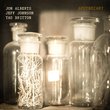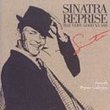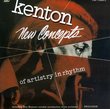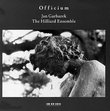| All Artists: Henry Threadgill Zooid Title: This Brings Us To, Vol. 1 Members Wishing: 2 Total Copies: 0 Label: Pi. Recordings Original Release Date: 1/1/2009 Re-Release Date: 10/27/2009 Genres: Jazz, Special Interest, Pop Style: Avant Garde & Free Jazz Number of Discs: 1 SwapaCD Credits: 1 UPC: 808713003123 |
Search - Henry Threadgill Zooid :: This Brings Us To, Vol. 1
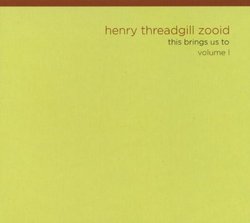 | Henry Threadgill Zooid This Brings Us To, Vol. 1 Genres: Jazz, Special Interest, Pop Henry Threadgill is one of the most popular musicians in cutting-edge jazz. He has been recording for 40 years, including with his popular groups Air, Sextett, Very Very Circus, and Make a Move. It has been eight years sin... more » |
Larger Image |
CD DetailsSynopsis
Album Description Henry Threadgill is one of the most popular musicians in cutting-edge jazz. He has been recording for 40 years, including with his popular groups Air, Sextett, Very Very Circus, and Make a Move. It has been eight years since Threadgill's last release, resulting in much pent-up demand from his fans. Among the best selling artists in the Pi Recordings catalog, his two releases have each sold over 5,000 units. Full press mailing to newspapers, general interest magazines, music critics, jazz and contemporary classical music magazines, and influential blogs. Full radio servicing to CMJ & JazzWeek panel jazz stations, and NPR programming. Pi will launch a targeted online campaign through various relevant sites. Similar CDs
Similarly Requested CDs |
CD ReviewsZooid -- Henry Threadgill's utterly distinctive quintet R. Hutchinson | a world ruled by fossil fuels and fossil minds | 11/08/2009 (5 out of 5 stars) "The last time Henry Threadgill released a new record was 2001, and I titled my review "Henry Threadgill is back!" because it had been 4 years since his last release. This time it was an 8-year wait, so the same title applies multiplied by 2. If you are familiar with Threadgill's music you are not going to be surprised -- he maintains his high standards with more of the uniquely Threadgillian music he has been making since he formed his first Sextett (which was really a septet) back in the early 1980s. He is literally incomparable -- he sounds like no one else, but he always sounds like himself. The original Zooid line-up featured strings, with acoustic guitar, cello and oud (see my review of UP POPPED THE TWO LIPS). I didn't think this was totally successful as the lines had a tendency to blur and become indistinct. The current band is a quintet, like his previous Make a Move unit (see my review of the 2001 release EVERYBODY'S MOUTH'S A BOOK), and still features Liberty Ellman on guitar and Jose Davila on trombone and tuba from the 2001 Zooid band. Stomu Takeishi, a long-time Threadgill collaborator, plays bass and Elliot Humberto Kavee plays drums. Threadgill alternates between alto sax and flute. This is a perfect combination, with each voice clear and strong despite the guitar and bass being acoustic rather than electric as in Make a Move. Perhaps this is partly due to the fact that the record was produced by Liberty Ellman. The liner notes, which are not included with the disc but can be found on the Pi Recordings website, explain that Threadgill has developed a new system of improvisation since the 2001 recordings: "[t]he compositions are organized along a series of interval blocks comprised of three notes, each of which is assigned to a musician, who is free to move around within these intervals, improvising melodies and creating counterpoint to one another." This is something the listener can use in order to hear the parameters of the compositions, but in any event one has only to hear the record to immediately recognize Threadgill's sound world. The music is rhythmically propulsive and tight in the way that only a band that has played together for years can achieve. Threadgill has been mining the same distinctive sound for 30 years now, and it is still a rich vein. Threadgill's Air trio of the '70s, which came out of Chicago's AACM, explored the intersection of composition and free improv. The Sextett of the '80s and Very Very Circus of the '90s (with twin guitars and tubas!) both featured complex compositions that emphasized unusual textures, and utilized a dark, minor key harmonic palette, and THIS BRINGS US TO, VOL. 1 does not mark a sharp stylistic departure. There is improvisation, but it is tightly constrained, as described above. Threadgill has never been known primarily as a virtuoso alto soloist, rather his strength is as a composer and arranger. He utilizes rhythmic structures from Jellyroll Morton, sophisticated counterpoint, and subtle harmonic shifts that do not resolve. Threadgill was winning Best Composer awards from Downbeat Magazine back in the early/mid 90s and he is still one of the finest in 2009! One of the best concerts I ever saw was the Henry Threadgill Sextett, September 7th, 1981 at the Underground Fest in Chicago, (the "afterfest" of the JazzFest, then in its second year), with Olu Dara on trumpet and Craig Harris on trombone (I still have the program). I remember the walls of the near-West Side loft honoring Ellington and Mingus for the Sextett's performance, which at that time was a radical reincorporation of the past into the free jazz scene. They blew the roof off with wild collective improvisation -- I drove home the morning of the 8th as the sun was coming up, and have been a devoted fan of Henry Threadgill ever since! This disc only contains about 40 minutes of music, which is great, it's about the length of an old vinyl LP, but promises more to come with the Vol. 1 in the title. However, we have even more to look forward to in the near future -- Mosaic Records has scheduled for late Summer 2010 release one of their deluxe limited edition boxes called HENRY THREADGILL: THE COMPLETE NOVUS & COLUMBIA RECORDINGS OF HENRY THREADGILL & AIR. That will go some considerable distance to please fans like me who have long bemoaned the fact that so many of Threadgill's great records have gone out of print and are unavailable! What's more, Black Saint has now released HENRY THREADGILL: THE COMPLETE REMASTERED RECORDINGS ON BLACK SAINT, a 7-disc box with 4 Air discs and 3 Threadgill solo discs. (verified purchase from the Jazz Loft)" Puzzle pieces make a great album Anthony Cooper | Louisville, KY United States | 02/07/2010 (4 out of 5 stars) "Henry Threadgill bookends this disc with two very free songs, presumably to warm you up and cool you down. The middle four songs are very hot jazz. The songs have each player -- Henry Threadgill on alto or flute, Liberty Ellman on guitar, Jose Davila on tuba/trombone, Stomu Takeishi on bass, and Elliot Humberto Kavee on drums -- playing half or 3/4 phrases that fit together to a polyrhythmic awesomeness. The solos by Threadgill or Ellman (who sounds very good) are untraditional because they're resolutely unshowy and more concerned with navigating the twisting alleys of each song. This is the best Threadgill I've bought (maybe there are better ones I haven't found yet), and recommended for fans or anyone curious about the saxophonist. " Henry Threadgill woke up. Never fall back asleep, dude. J. GARRATT | 03/26/2010 (5 out of 5 stars) "Ah, Henry Threadgill. I love his music but I don't know why. I don't even fully understand how it works. Something about intervals? Instead of improvising around blocks of chords, the band improvises around intervals? I took music theory in high school and in college and I can't really tell you what that means. But it's not like you need to understand that to enjoy Henry Threadgill. It just helps to know that there is a jazz musician out there who operates differently, not just giving us another rendition of "Autumn Leaves" or something like that.
This new album takes time. I know because I consider myself a Threadgill fan, and it took me a while to overcome initial disappointment. You see, when I first heard 1997's "Where's Your Cup?" I almost had to stop the car when "100 Year Old Game" began to kick in. It's the type of song that when the groove starts, it can stop you cold. It's that good. Grabs you by the collar. But "White Wednesday Off the Wall" is the opposite. A small flute and guitar motif nudge it into existence. And for the bulk of its four minutes and 58 seconds, it seems to barely be there. In low enough volume, you can easily forget that you have a CD or mp3 playing. The package picks up with "To Undertake My Corners Open" (I never know what his titles mean), another sly composition that can deceptively sound like noodling mush the first half dozen times you hear it. And so it goes for the majority of the album; the seemingly randomly composed burps of notes from guitarist Liberty Ellman, the heavily syncopated and choppy improvisation of Threadgill himself on sax and flute, the trombone acting to offset whatever is going on, the tube playing more of a counter-melody than a bassline (witness the beginning of "Chairmaster"). Explaining it all is not easy, so therefore you just need to take my word on it and persevere through the maze that is Henry Threadgill's music. Even if you theoretically don't understand what's going on here, you can still arrive at a general "I get it!" point. Man, I hope the Zooid group stays active. And I hope we don't have to wait another eight years for another CD from them." |


